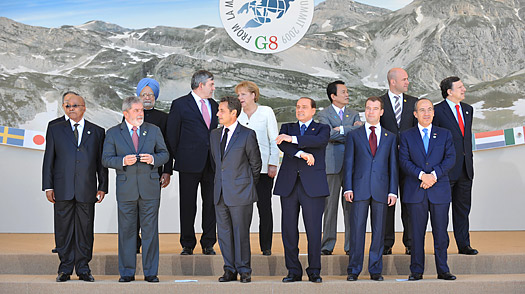
Heads of state at the G-8 summit in L'Aquila, in central Italy, on July 9
There was a time when eight was enough: The annual meetings of the leaders of the world's eight most industrialized nations (well, seven, plus Russia, which while lagging well behind in the economic stakes, was deemed a politically wise addition back in the mid-1990s) were once the unquestioned epicenter of global economic and military might. The G-8 summits staged in scenic spots around the world offered an opportunity for the key leaders of the Northern Hemisphere to chart the direction of the world economy, for thousands of protesters to gather and voice to Quixotically challenge that direction amid clouds of tear gas.
But things have changed as the G-8's power has been challenged — not by the anti-globalization protesters, but by the rising economic and political influence of the countries shut out of the exclusive club. The guest list for this week's summit in Italy made clear that the core members — the United States, Japan, Germany, France, Britain, Italy, Canada and Russia — are no longer capable of addressing the key global problems among themselves. After only a half-day of meeting in the central Italian host city of L'Aquila, the G8 expanded its table to include the so-called G5 emerging economies — China, India, Brazil, South Africa and Mexico. After all, no discussion of consequence on the direction of the world economy, or on curbing global warming, could be held without them. Then Egypt was added as a "plus one." Then came three additional European countries, Spain, the Netherlands, and Turkey; members of the Major Economies Forum (17 countries) and four more African countries.
The host Italians have made it clear that they like the current G-8+5+1 formula, although that's hardly surprising coming from one of the minor members of the eight. At the Thursday morning session, Brazil's President Lula da Silva urged changes in the format to give the emerging economic powers a voice to match their growing economic influence. U.S. Deputy National Security Adviser for International Affairs Mike Froman said further discussions are welcomed. "There is no one perfect format for all issues," he said.
President Barack Obama, speaking in Moscow on Tuesday, explained the need to throw open the guest list. "There was a time when Roosevelt, Churchill and Stalin could shape the world in one meeting. Those days are over," he said. "The world is more complex today. Billions of people have found their voice, and seek their own measure of prosperity and self-determination in every corner of the planet."
Founded in 1974 (as the G6) in response to the oil crisis, the group added Canada in 1977 and began inviting the then-Soviet Union in 1991. Although the group remained at eight after Russia's inclusion, countries as varied as Iraq, Jordan, Yemen, Tanzania and Ethiopia began receiving invites to its summits. And the global financial crisis has only increased the urgency of transnational coordination of policies and financial regulatory measures. And the growing economic muscle of countries such as China, India and Brazil has prompted many to question the relevance of the G-8 as a forum.
Loretta Napoleoni, a London-based economist sees "image politics" as the sole purpose of the G-8. "They meet, they kiss, they make declarations. In the end it's really just a show," says Napoleoni. "The G8 is conceived of as an informal gathering. It doesn't have the power to make any major change."
Author of Rogue Economics: Capitalism's New Reality, Napoleoni notes that the financial crisis itself has exposed fundamental differences that these summits simply can't resolve. "Germany wants an exit strategy now. [Britain's Prime Minister] Gordon Brown says we have to wait for the crisis to be over. So they do nothing. If they really want to change the monetary system, they know that they can sit down and rewrite Bretton Woods," says Napoleoni referring to the 1944 agreement that established the basic guidelines for post-WWII global trade and finance.
Napoleoni argues that a structure capable of responding to global challenges would have to be given teeth and based in a fixed location, like the United Nations is. "Why are we spending all this money on these summits?," she says. "Why are we building up expectations that are never met?"
Still, it is more likely that the G8 will evolve rather than dissolve. The accord signed Thursday in L'Aquila on curbing carbon emissions had 14 signatures, although consensus could not be found on a more strongly worded joint declaration. Some blame that failure on the abrupt departure of China's President Hu Jintao on Tuesday, who left Italy to deal with the violence in China's restive Xinjiang province. That seemed to underscore the point that in today's interconnected world, no matter what number follows the "G", it won't have much punch if it doesn't include China.